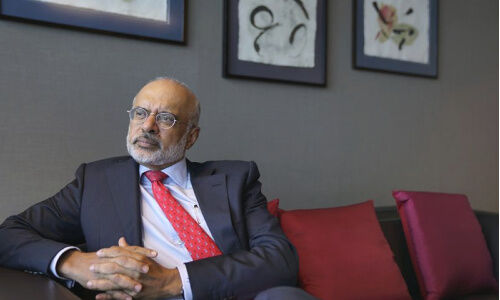Piyush Gupta Marks A Decade With Pay Bump
DBS' chief executive received a bump-up in his paycheck to match the 14 percent year-on-year growth in the bank's full-year profits for 2019. Last year also marks the chief's 10th year at Singapore's largest bank.
DBS Group Holdings chief executive Piyush Gupta is still Asia's highest-paid banker. The Indian-born finance executive saw his 2019 pay rise about 2 percent from last year, the bank's latest annual report on Monday showed. At S$12.1 million, it is up by S$230,000 from a year ago, comprising a cash bonus of S$4.59 million, shares worth S$6.27 million, and a basic salary of S$1.2 million.
The pay increment comes on the back of delivering a record-high net profit for the bank of S$6.39 billion, as well as an enviable return on equity of 13.2 percent. «2019 was a pivotal year for us. We were the first bank to hold three global best bank honors at the same time and to be recognized among the top 10 business transformations of the decade by Harvard Business Review,» the lender said in its annual report.
A Decade In Service
In November last year, the DBS board granted a one-time special recognition award of 80,000 shares, which are subject to DBS’s usual four-year vesting period. This was to recognize Gupta's «outstanding contributions» over the past decade of his leadership, the bank said. During this period, DBS’s total income has more than doubled, net profit has tripled, and market capitalization has nearly doubled.
«The results underscored the success of a journey we embarked on a decade ago. In February 2010, we had unveiled a nine-point strategy to transform the bank. In last year’s annual report, I wrote about how its steadfast and nimble implementation had since structurally improved the profitability of our franchise,» wrote DBS Group Chief Financial Officer Chng Sok Hui.
Digitalization Dividends
Despite the negative effects of the U.S.- China trade war last year, DBS' balanced growth story stems partly from years of digitalization efforts. The number of digital customers in the Consumer and small-medium enterprises (SME) businesses in Singapore and Hong Kong increased by 0.4m during the year to 3.3 million.
As a result, the proportion of digital customers rose to 52 percent from 48percent in 2018, and 42 percent in 2017 due to new customer acquisition and customer migration from the traditional segment. «A typical digital customer continued to generate twice as much revenue as a traditional customer. The cost-income ratio of the digital segment improved by one percentage point to 33 percent, which was 20 percentage points below the traditional segment’s 53 percent.»
A New Era Ahead?
How much more dividends DBS can reap from its digitalization efforts remains to be seen, as the entire banking industry enters the year with lower interest rates. The departure of Fintech star Neal Cross in January last year, plus the arrival of digital banks on the shores of Singapore and Hong Kong could mark a new era ahead.
While Gupta acknowledges the advantages of new digital banking entrants in Singapore, such as freedom from legacy problems and access to large resources, he is quick not to label them as worthy opponents as of yet. «They will quite possibly be able to disrupt the market in interesting ways and are not to be underestimated. However, I do not believe that it will be easy for new entrants to be successful in the short or medium term,» he said.




















